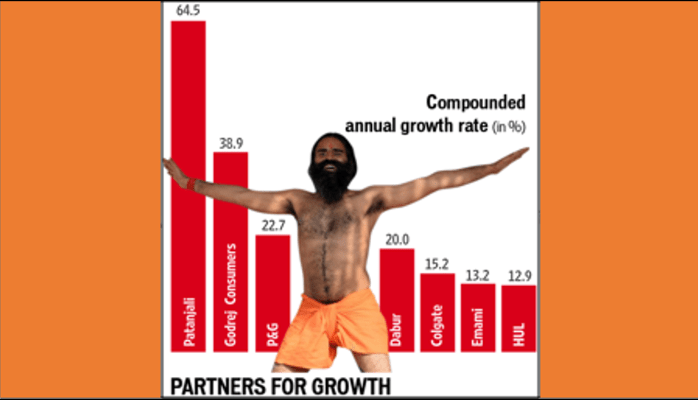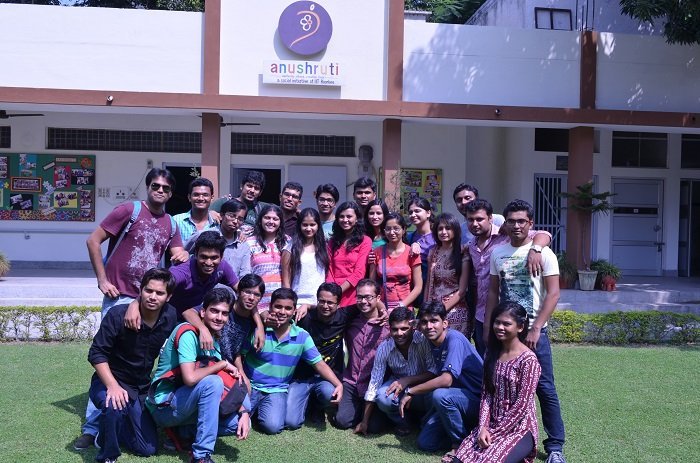Formed in 1997, Patanjali Ayurved is perhaps the fastest growing FMCG firm in India with annual revenues reportedly at more than Rs 2,000 crore. Patanjali has expanded its portfolio to over 400 stock-keeping units, entering categories like noodles and skin care, in the process stretching their equity far more than they perhaps should. Ramdev is reported to have said in one of the interviews that he expects to take the revenue to Rs 10000 crore after the launch of Patanjali noodles taking on the Nestle Maggi. So what is the secret behind the huge success of Ramdev Baba’s Patanjali products? Are the products overrated?

Image Source : Hindustan Times
Patanjali products are not revolutionary but they bring the feeling of credibility. In India, Ayurveda universities had been working for decades but academic and industry interface was so poor that both didn’t influence each other’s strengths. It is the only brand that has been located in the ‘physical, mental, spiritual application of Yoga’ or ‘Mind-Body-Soul Axis’. It may be understood as more of ‘Ritual Brand’ than a ‘Product Brand’. The Yoga Workout has fired up millions. People have a new hope drawn from an ancient wisdom. A hope that doing “Pranayama’ will oxygenate deeply seated cells and provide healthy long life. The hope gets converted into belief as people perceive the experience and feel that it really works! This value belief, built over a decade, now effortlessly travels through most Patanjali products.
Another reason behind the success of Patanjali is that they don’t employ any fancy managers with MBA degrees. Instead of selling to the retail trade through distributors, they have their own branded outlets around the country. Their production units are relatively modest. The savings in distribution margins and the low overheads straightaway translate into a 20-25 per cent cost advantage which gives the company the leverage to price its products at least 15-30 per cent cheaper than other brands in competition.
All the products of Patanjali are made in India which is one of the best ways to help Indian Economy grow. It also means that all the profit stays in India , no matter where the profit is used. Though, I am pretty sure the money gained by profit is used in much better manner then the profits earned by Coco Cola or McDonalds. Have a visit at Patanjali Ashram at Haridwar, you will be surprised, and it’s in the news that he is going to start a world class educational university at Haridwdar too. So money is well spent. Money that we spend for those products, stays in India and eventually comes back to us only, and also helping us.
Products Quality is very good and comparable to all the other imported goods that we consume on daily basis, and also you get almost everything in the same brand. One thing you can be sure of is that there is no mixing in the products for quick profits. Its 100% legit. Food Products are much healthier than other competitors in the market. For example Whole Wheat is used in all wheat products, no maida is used just to make profit and make it tasty. For example Patanjali noodles are pretty decent and comes very close to Maggi noodles. Also the products are cheaper than other competitors in the market.
It will be interesting to track how Patanjali is evolving in India and what it means to Indians today or to the world tomorrow. Today, the stores of Patanjali have no distinct brand identity. In fact, they are stores with open shelves, no air conditioning, no brand color-coded uniforms, no computerized billing and no trained sales or support staff. With its e-commerce presence, patanjaliayurved.net, it is already an emerging IT-enabled ‘retail service brand’. Patanjali successfully competes with global and national brands on the shelf and more significantly at full prices without consumer promotions in most categories. Patanjali will soon capture the whole market of India if it continues to grow in such a rate.
Tags: Ayurved dabur FMCG Patanjali RamdevYou might like reading:

Can Human resource be a competitive advantage ?
The main objective of a business organization is to gain profit, and for this, a firm must establish its name amongst the customers. Every business organization strives to achieve this position in the market, and as a result, the competition is always neck to neck amongst all the players. Gaining an edge over the other players is what each and […]

BHOR-A Social Awakening at DoMS, IIT Roorkee
“We make a living by what we get but we make a life by what we give.” -Winston Churchill Bhor is the social awakening initiative of the Department of Management Studies, IIT Roorkee. Our department believes in developing a socially responsible mindset in the students and hence, crafting humane corporate leaders of tomorrow. Every year, during the deaf awareness week, […]






























